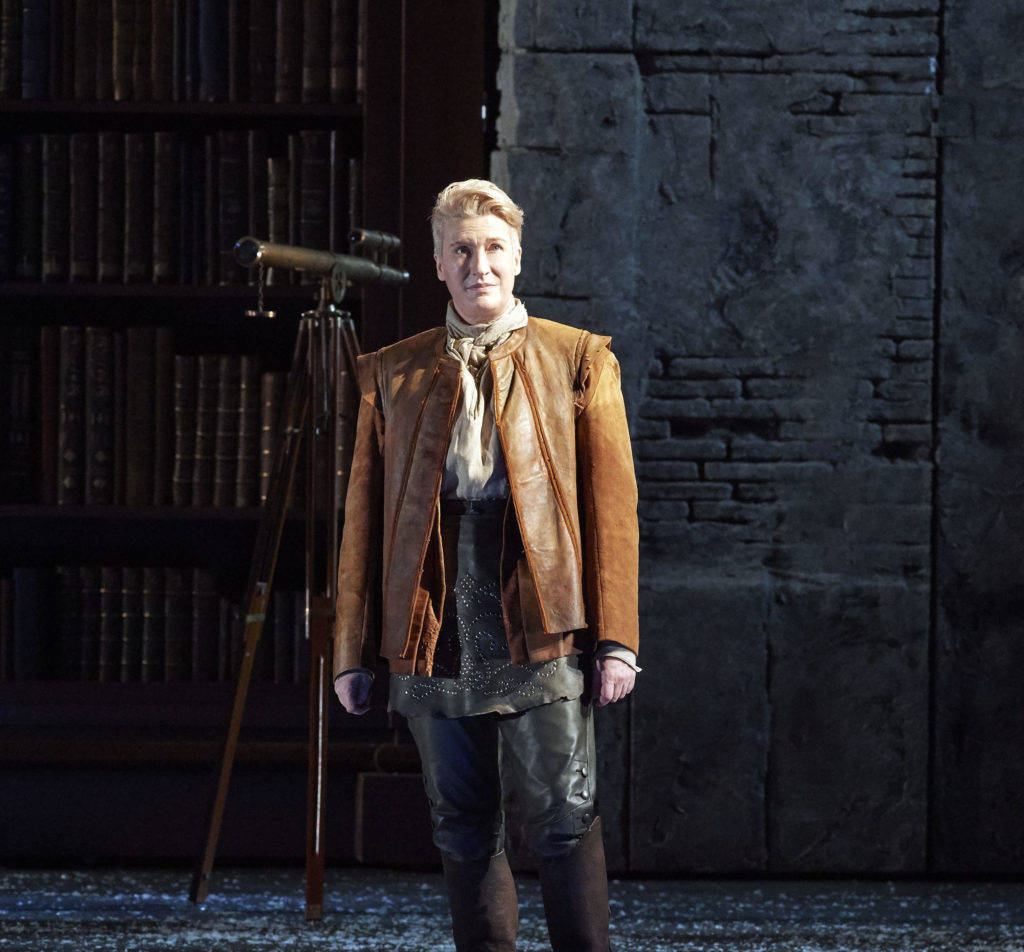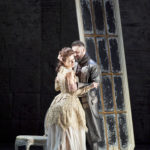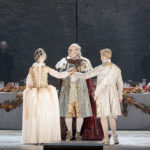 In David McVicar’s production for Vienna State Opera, the sets are minimalist, functional rather than designer chic. The castle ramparts, the walls sliding screens, have elaborately pointed brickwork, always interesting. Costumes are 18th century , but updated in an intelligent mix. And the orchestra in the pit is William Christie’s Les Arts Florissants playing on period instruments.
In David McVicar’s production for Vienna State Opera, the sets are minimalist, functional rather than designer chic. The castle ramparts, the walls sliding screens, have elaborately pointed brickwork, always interesting. Costumes are 18th century , but updated in an intelligent mix. And the orchestra in the pit is William Christie’s Les Arts Florissants playing on period instruments.
Sarah Connolly’s Ariodante is surprisingly masculine, short auburn hair, wearing a timeless, military-inspired tan leather outfit. Chen Reiss’s Ginevra , in a white lace gown, sings how jewellery and perfume will make her more desirable to her beloved; Reiss is at her toilette, three mirrors in place for her dressing room. Dalinda (Hila Fahima) sings , are you in love my lady. Both sopranos are physically similar- in the plot, Dalinda is unwittingly used by Ariodante’s rival Polinesso: she’s dressed up as Ginevra, flirting with another man. Fahima’s Dalinda, not to confuse us, is cast in black.
 Polinesso (countertenor Christophe Dumaux), menacingly creeps up on Reiss, almost touching her neck with his sword. I can no longer live apart from your beautiful eyes, he sings . She: You are loathsome. No murderer is uglier than you. (Actually, Dumaux, fashionably bearded, is rather desirable.) And what a sensational voice, Handel’s contralto roles, in their astonishing virtuosity, the equivalent of (20th century) black singers’ sexy falsettos.
Polinesso (countertenor Christophe Dumaux), menacingly creeps up on Reiss, almost touching her neck with his sword. I can no longer live apart from your beautiful eyes, he sings . She: You are loathsome. No murderer is uglier than you. (Actually, Dumaux, fashionably bearded, is rather desirable.) And what a sensational voice, Handel’s contralto roles, in their astonishing virtuosity, the equivalent of (20th century) black singers’ sexy falsettos.
In Polinesso’s aria, Cupid played a terrible game. He is inflamed; she is cold to him. Loathsome, she repeats. But Dumaux seems very physical, bullying, short of physically molesting her. What an arrogant beauty, he complains, while he goes around with a whip, he’s constantly flexing. Dumaux, sings of his odious deception elaborately disguised in fine garb.
Meanwhile Fahima’s Dalinda, pleads, in her aria – Open your eyes! Someone longs for you. She’s in love with him, and he, apparently, unaware of it.
The scene changes to a royal banqueting table. Very handsome sets, oak-engraved bookcases recessed. Connolly, in Ariodante’s aria, sings the stream and the trees all speak to my amorous heart of love. And, to Ginevra, one who controls my heart cannot be my humble subject. In their duet, they sing, their passion is inextinguishable.
At the centre of the plot are the lovers Ariodante and Ginevra, she, the daughter of the Scottish king and Ariodante, his favourite. The King, bass Wilhelm Schwinghammer, wearing a long cloak over plaid, blesses the couple.  (Let boundless joy fill your hearts.) He offers Ariodante a gift: the heart of his daughter, and the throne. (Chenn Reiss is indeed ravishing.) Then, a Ballet (Vienna State Ballet). Prepare a feast for these loving hearts. The servants bring on what looks like a crate of beer; (rather anachronistic.) Dramatically, this idyllic scene is to be shattered: by jealousy and intrigue.
(Let boundless joy fill your hearts.) He offers Ariodante a gift: the heart of his daughter, and the throne. (Chenn Reiss is indeed ravishing.) Then, a Ballet (Vienna State Ballet). Prepare a feast for these loving hearts. The servants bring on what looks like a crate of beer; (rather anachronistic.) Dramatically, this idyllic scene is to be shattered: by jealousy and intrigue.
By promising her marriage, Polinesso persuades Dalinda to disguise herself as Ginevra, and so admit him to her room. Fahima sings, she hopes that his wounds will be healed by her charms. But Dumaux, in his aria, sings with phenomenal coloratura, it’s for her (Ginevra) he will give all his love. It is for her beautiful eyes… That such an earthy, brutal sod- Dumaux in black leather- can sing so sublimely! Then to Dalinda, ‘his only hope’, Oh the flame she radiates is the light of his life. Sensational!
Meanwhile, at the wedding gig, Reiss sings of the first flames of love burning so bright, never to be extinguished. Stunning high notes, breath-taking. Handel’s Chorus (Gustav Mahler Choir) sing, rejoice in your love, beautiful hearts. Those at the table enact an elaborate, ecstatic mime; now a ballet performed before the royal banquet. Then a whoop! as the stage erupts into a Scottish gig; the ladies pirouetting; and the chorus, rejoice in your love, for it is your devotion that makes you happy. ( The sheer beauty of Handel’s music cannot be adequately described.)
Opening Act 2 , Ariodante sings, he’s so full of joy, he can hardly sleep. The night will be his. On the grey-bricked stage, in the castle turrets, a light appears out of a high aperture. A man with Ginevra? He challenges Polinesso, prepare to die if you are lying. But, if my beloved has been untrue to me, I shall die of despair. Dumaux looks truly villainous, in his black leather, almost piratical. This straight betrayal of love calls for punishment, sings Ariodante’s brother, Lurcanio (Rainer Trost). Goodness, it’s a sword fight!
 Ariodante’s protracted aria Scherza infida , one of the opera’s most memorable. To a mandolin accompaniment, O faithless one, exult in the embrace of my rival! Thanks to her deceit, he contemplates death. Connolly stands, barely moving, in lament; now kneeling, pleading in despair. Connolly’s mezzo has a classical purity, but passionate: unforgettably moving in the closing high notes, O faithless one, endlessly repeated. The stage is subsumed in a white mist.
Ariodante’s protracted aria Scherza infida , one of the opera’s most memorable. To a mandolin accompaniment, O faithless one, exult in the embrace of my rival! Thanks to her deceit, he contemplates death. Connolly stands, barely moving, in lament; now kneeling, pleading in despair. Connolly’s mezzo has a classical purity, but passionate: unforgettably moving in the closing high notes, O faithless one, endlessly repeated. The stage is subsumed in a white mist.
The plot hits its target! From now on Polinesso will get a joyful reception, he sings. So Reiss greets the once hateful Polinesso. How dear you will be to my heart. Dumaux’s Polinesso congratulates himself, If my treachery has proven effective, I shall despise love forever! Dumaux’s coloratura has us gasping with delight. Audience bravos!
The King hears that his favourite Ariodante is dead: it’s announced, he jumped from the cliff in despair. Jealous, cruel fate, sings the king.
Reiss’s un-adulterated pure soprano sings, My heart is a flutter, and I know not how to stop it. She sings accused of infedelity: that last night, she’d opened the gate for a secret lover. The King’s love for his daughter conflicts with his obligation to punish her.
Reiss’s powerfully delivers in Ginevra’s aria. Am I a shameless harlot? She calls on the gods, am I still alive? Reiss is in white- fragile, vulnerable. Where are you death? Why can’t she die. Pitiful, pleading: unembellished, from the heart. (And to think she played Janacek’s Cunning Little Vixen here.)
A masque is performed in slow motion: Reiss like a puppet- her head in a white cage- is closely embraced by an elderly man; almost groped. The stage is dominated by a stag’s head, suspended. Dancers dressed as impish, devilish spirits. She sings of her dream.
In the third part, Connolly and Reiss again excel in their respective arias. In Ariodante’s aria, O gods, you sent me a thousand deaths; I have been betrayed. Then Dalinda confesses, she was deceived by Polinesso. Ariodante gets it: the woman betraying him was not Ginevra. Cieca notte: Dark night, deceitful glances, ill-fated, disguised. Connolly sweeps all away in her sheer conviction, mining the reserves of human emotion.
The King, Schwinghammer’s huge form cowering, asks for his daughter back: enough of playing father and king. In a heartrending reunion, you are dear to me, she sings, but unjust. In her aria, Reiss sings movingly, O, merciful heaven, take pity on my royal honour. We see her, now in her dressing room, the mirrors daubed in red graffiti, IMPURA.
Ariodante appears as an unknown knight to defend Ginevra’s honour, knowing of her innocence. Yes, after the dark light, the sun shines brighter, filling the earth with joy, Connolly sings. Musically faultless, but- dramatically-I’d imagined darker colours, a lower range? But Connolly’s expressive mezzo represents modern Handellian tradition, in a castrato role.
If I had a thousand lives, a thousand hearts, I would dedicate them all to you! they sing. The castle walls are moved away -under brilliant light- to reveal a boundless seascape. Let everyone praise fair virtue, which prevails in joy, sing the chorus. And another ballet sequence to close.
Under William Christie’s Les Arts Florissants, Handel has never sounded more seductive. The period instrument band were spritely, rhythmic, virtuosic-the motor driving this (4 hour) journey of musical delights.© PR 8.3.2018
Photos: Sarah Connolly (Ariodante); Chen Reiss (Ginevra) and Christophe Dumaux (Polinesso); Sarah Connolly, Chen Reiss, Wilhelm Schwinghammer (King of Scotland); Sarah Connolly (Ariodante); Featured image: Christophe Dumaux (Polinesso)
© Wiener Staatsoper / Michael Pöhn
